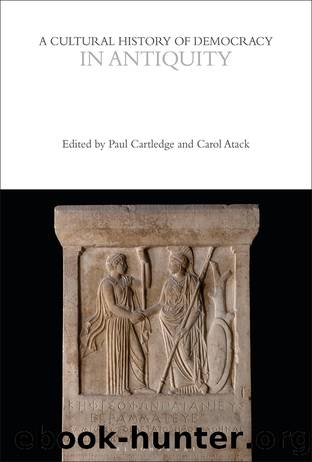A Cultural History of Democracy in Antiquity by Paul Cartledge;Carol Atack;

Author:Paul Cartledge;Carol Atack;
Language: eng
Format: epub, pdf
Publisher: Bloomsbury UK
FIGURE 6.5 Scene from the inside of a kylix showing an older man propositioning a younger man, with allusions to both athletic and sympotic contexts. Douris, c. 470â460 BCE, Athens. Metropolitan Museum of Art, 52.11.4.
The ambiguity between acceptable pederastic relationships and unacceptable ones offered scope for pursuing political rivals with claims about their past behavior. Aeschinesâ speech shows how an accusation of prostitution could be used as a political weapon, with the intention of forcing a rival out of politics. The consequences for men of being labeled a prostitute were somewhat different from those for women, because they could lead to prosecution on charges for which a standard punishment was atimia, or the loss of citizen rights; Aeschines cites a law listing the political and religious functions from which the convicted citizen will be barred (Aeschin., In Tim. 21).
Aeschines presents Timarchus as a man of dissolute habits in the present, exemplified by his presentation in public; his performance of citizenship in the present is a marker of his past dissolution. Timarchus has contravened standards of dress and behavior, speaking âjust nowâ in the assembly first with his arm outside his cloak and then discarding his cloak entirely to âwrestle naked in the assembly, with his body in a bad and shameful state through drunkenness and foul behaviourâ (Aeschin., In Tim. 26). His performance contrasts strongly with that of Xenophonâs Ischomachus, a character who exhibits all of the qualities of the gentleman (Xen., Oec. 6.13â17). In introducing this character, Xenophon has Socrates say that he first looked for the âgentlemanâ among those who were physically beautiful but found that they were often âdepraved in their souls.â
The ideology underlying the objection to prostitution is the strong and continuing idea (seen in other cities, and in Roman republican ideology) of the inviolability of the citizen body (Halperin 1990: 88â112). Both the act of being penetrated and receiving payment for it were problematic; the performance of bodily services was the province of slaves and noncitizen workers, and the presumption was that citizens would not engage in improper physical contact (Cohen 2015; Halperin 1990).
Rome did not have a culture of pederasty, but its courts heard similar accusations, in which political and economic misdeeds were associated with nonconformity with the gender norms attached to the idea of citizenship. The lifestyle and behavior of Catiline, who led a rebellion against the established regime in the late Roman Republic, is one example. Contemporary historian Sallust argues that the political culture of the Roman Republic was in moral decline; âmen let themselves be used as women, while women prostituted themselvesâ (Sall., Cat. 13.3). The same association between homosexuality, womenâs sexuality, and prostitution was drawn, and again connected to a lack of self-control and to undisciplined physical appetites (Rauh 2011; Williams 1999).
In this case enemy politician Cicero, too, famously challenges norms of the performance of masculinity within Roman republican politics, as he rose through the ranks of Roman leadership in the courts rather than through military leadership, and was a ânew manâ (Cic.
Download
A Cultural History of Democracy in Antiquity by Paul Cartledge;Carol Atack;.pdf
This site does not store any files on its server. We only index and link to content provided by other sites. Please contact the content providers to delete copyright contents if any and email us, we'll remove relevant links or contents immediately.
The European History Highway: A Guide to Internet Resources by Dennis A. Trinkle Scott A. Merriman(498)
The Seven Wonders of the Ancient World by Michael Denis Higgins(479)
European Security in a Global Context by Thierry Tardy(472)
European Security without the Soviet Union by Stuart Croft Phil Williams(472)
The Routledge companion to Christian ethics by D. Stephen Long Rebekah L. Miles(461)
Hudud Al-'Alam 'The Regions of the World' - a Persian Geography 372 A.H. (982 AD) by V. V. Minorsky & C. E. Bosworth(402)
Gorbachev And His Generals by William C. Green(393)
Get Real with Storytime by Julie Dietzel-Glair & Marianne Crandall Follis(391)
Tibetan Studies in Comparative Perspective by Chih-yu Shih Yu-Wen Chen(387)
Governance, Growth and Global Leadership by Espen Moe(385)
Hyperculture by Byung-Chul Han(382)
CliffsNotes on Fitzgerald's The Great Gatsby by Kate Maurer(363)
The Oxford History of the World by Fernández-Armesto Felipe;(357)
How Languages Are Learned 5th Edition by Patsy M Lightbown;Nina Spada; & Nina Spada(355)
The Egyptian Economy, 1952-2000 by Khalid Ikram(355)
Oral Poetry and Narratives from Central Arabia: The Poetry of Ad-Dindan : A Bedouin Bard in Southern Najd (Studies in Arabic Literature, Vol 17) (English and Arabic Edition) by P. M. Kupershoek P. Marcel Kurpershoek(345)
The Oxford Handbook of the Incas by Sonia Alconini(336)
Europe Contested by Harold James(323)
The Hutchinson Dictionary of Ancient and Medieval Warfare by Peter Connolly John Gillingham John Lazenby(308)
